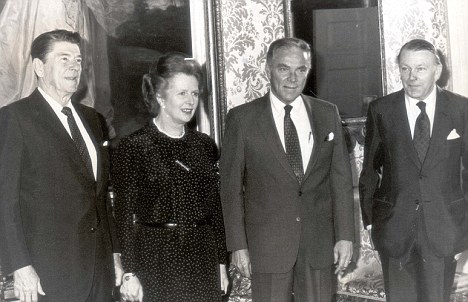<Back to Index>
- Deputy Prime Minister of the United Kingdom William Stephen Ian Whitelaw, 1918
- Secretary of State for Foreign and Commonwealth Affairs Peter Alexander Rupert Carington, 1919
- Secretary of State for Foreign and Commonwealth Affairs Francis Leslie Pym, 1922
PAGE SPONSOR
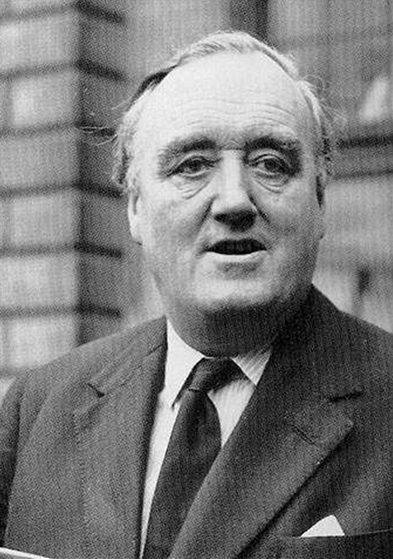
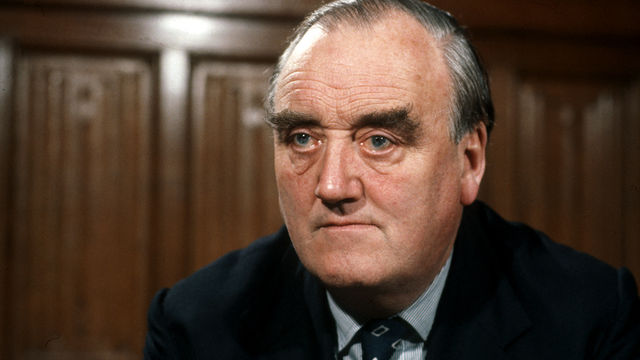
William Stephen Ian Whitelaw, 1st Viscount Whitelaw (28 June 1918 - 1 July 1999), often known as Willie Whitelaw, was a British Conservative Party politician who served in a wide number of Cabinet positions, most notably as Home Secretary and Deputy Prime Minister.
Whitelaw was born in Nairn, in northeast Scotland. He never knew his father, who was killed in the First World War when he was a baby. He was educated at Winchester College and Trinity College, Cambridge, where he won a blue for golf and joined the Officer Training Corps. By chance he was in a summer camp in 1939 on the outbreak of the Second World War and was granted a regular, not wartime, commission in the British Army, in the Scots Guards, later serving in the 6th Guards Tank Brigade, a separate unit from the Guards Armoured Division. He commanded Churchill tanks in Normandy during the Second World War and during Operation Bluecoat in late July 1944, his was the first Allied unit to encounter German Jagdpanther tank destroyers, being attacked by three out of the twelve of these vehicles which were in Normandy.
The battalion second - in - command was killed when his tank was hit in front of Whitelaw's eyes and Whitelaw succeeded to this position, holding it, with the rank of Major, throughout the advance through the Netherlands into Germany and until the end of the war. He was awarded the Military Cross for his actions at Caumont; a photograph of Field Marshal Bernard Montgomery pinning the medal to his chest appears in his memoirs. After the end of the war in Europe, Whitelaw's unit was to have taken part in the invasion of Japan but the Pacific War ended before this. Instead he was posted to Palestine, before leaving the army in 1946 to take care of the family estates of Gartshore and Woodhall in Lanarkshire, which he inherited on the death of his grandfather.
After early defeats as a candidate for the constituency of East Dunbartonshire, he became Member of Parliament (MP) for Penrith and the Border at the 1955 general election, and represented that constituency for 28 years. He held his first government posts under Harold Macmillan as a Lord of the Treasury (government whip) between 1961 and 1962 and under Macmillan and then Sir Alec Douglas - Home as Parliamentary Secretary to the Ministry of Labour between 1962 and 1964. In 1964 Douglas - Home appointed him as Opposition Chief Whip. He was sworn of the Privy Council in January 1967.
When the Conservatives returned to power in 1970 under Edward Heath, Whitelaw was made Lord President of the Council and Leader of the House of Commons, with a seat in the cabinet. He became the first Secretary of State for Northern Ireland after the imposition of direct rule in March 1972 and he served in that capacity until November 1973. During his time, in Northern Ireland he introduced Special Category Status for paramilitary prisoners. He attempted to negotiate with the Provisional Irish Republican Army with the then PIRA Chief of Staff Seán MacStiofáin in July 1972. The talks ended in an agreement to change from a seven day truce, to an open ended truce, which did not last long. As a briefing for prime minister Edward Heath later noted, Whitelaw "found the experience of meeting and talking to Mr Mac Stíofáin very unpleasant". MacStiofáin in his memoir, complimented Whitelaw, saying was the only Englishman ever to pronounce his name in Irish correctly.
He left Northern Ireland in 1973 to become Secretary of State for Employment shortly before the Sunningdale Agreement was reached, to confront the National Union of Mineworkers over pay demands. The dispute was followed by the Conservative party's losing the February 1974 general election. Also in 1974, Whitelaw became a Companion of Honour.
Soon after Harold Wilson's Labour Party returned to government, Heath appointed Whitelaw as Deputy Leader of the Opposition and Chairman of the Conservative Party. After a second defeat in the October 1974 general election – during which Whitelaw had accused Harold Wilson of going "round and round the country stirring up apathy", Heath was forced to call a leadership election in 1975. Whitelaw loyally refused to run against Heath; however, and to widespread surprise, Margaret Thatcher narrowly defeated Heath in the first round. Despite standing, and losing convincingly, against Thatcher in the second round, Whitelaw managed to maintain his position as Deputy Leader until the 1979 general election, when he was appointed Home Secretary and Deputy Prime Minister in Thatcher's new government.
As Home Secretary, Whitelaw adopted a hard line approach to law and order. He improved police pay and embarked upon a program of extensive prison building. His four year tenure in office, however, was generally perceived as a troubled one. His much vaunted "short, sharp shock" policy, whereby convicted young offenders were detained in secure units and subjected to quasi - military discipline won approval from the public but proved expensive to implement and largely ineffectual in stemming burgeoning crime rates. He was the British Home Secretary during the 6 day long Iranian Embassy siege in London, 30 April 1980-5 May 1980.
In March 1981, he approved Wolverhampton council's 14 day ban on political marches in the borough in response to a planned National Front demonstration there.
Inner city decay, unemployment and the heavy handed policing of ethnic minorities (notably the application of the notorious sus law) sparked major riots in London, Liverpool, Bristol and a spate of disturbances elsewhere. The Provisional IRA escalated its bombing campaign on England, and Whitelaw was personally embarrassed by the incident wherein a purportedly mentally ill man breached security at Buckingham Palace, gaining access to the Queen's Bedchamber.
Two days after the 1983 general election, Whitelaw received a hereditary peerage (the first created for 18 years) as Viscount Whitelaw, of Penrith in the County of Cumbria. Thatcher appointed him Lord President of the Council and Leader of the House of Lords. Lord Whitelaw faced many challenges in attempting to manage the House of Lords, facing a major defeat over abolition of the Greater London Council within a year of taking over. However, his patrician and moderate style appealed to Conservative peers and his tenure is considered a success.
During his period as Deputy Prime Minister and Leader of the Lords, Margaret Thatcher relied on Whitelaw heavily, famously announcing that "every Prime Minister needs a Willie". He chaired the "star chamber" committee that settled the annual disputes between the limited resources made available by Treasury and the spending demands of other government departments. It was Whitelaw who managed to dissuade Thatcher in November 1980 from going to Leeds to take charge of the Yorkshire Ripper investigation personally.
After a stroke in December 1987, he was forced to resign.
Some people, Nicholas Ridley, among them, argued that
Whitelaw's retirement marked the beginning of the end of
the Thatcher premiership, as he was no longer around as
often to give sensible advice and to moderate her stance
on issues, or to maintain a consensus of support in her
own Cabinet and Parliamentary Party.
During his retirement and up until his death Lord Whitelaw was the Chairman of the Board of Governors at St Bees School, Cumbria. He was appointed a Knight of the Thistle in 1990.
He died of natural causes, aged 81, in 1999, survived by his wife of 56 years, Celia, Viscountess Whitelaw of Penrith (born 1 January 1917 - 5 December 2011), a World War II ATS, volunteer, philanthropist/charity worker and horticulturist. The couple had four daughters. Although Whitelaw was given a hereditary peerage, the title became extinct on his death as his daughters were unable to inherit. His home for many years was the mansion of Ennim just outside the village of Great Blencow near Penrith, Cumbria. He was buried at St. Andrew's Parish Church, Dacre, Cumbria.

Peter Alexander Rupert Carington, 6th Baron Carrington (6 June 1919 - 9 July 2018) was a British Conservative politician. He served as British Foreign Secretary between 1979 and 1982 and as the sixth Secretary General of NATO from 1984 to 1988. He was the last surviving member of the Cabinets of both Harold Macmillan and Sir Alec Douglas - Home. Following the House of Lords Act 1999, which removed the automatic right of hereditary peers to sit in the House of Lords, Carington was created a life peer as Baron Carington of Upton, of Upton in the County of Nottinghamshire, to enable him to continue to sit there.
Carrington was the only son of Rupert Carington, 5th Baron Carrington, by his wife the Honourable Sybil Marion Colville, daughter of Charles Colville, 2nd Viscount Colville of Culross. He was a great - nephew of the Liberal statesman Robert Wynn - Carington, 1st Marquess of Lincolnshire and the politician and courtier Sir William Carington. He was educated at two independent schools: at Sandroyd School from 1928 - 1932, at the time based in the town of Cobham in Surrey (and now the home of Reed's School), and Eton College, followed by RMC Sandhurst (since renamed RMA Sandhurst).
Following Sandhurst, he was commissioned into the Grenadier Guards as a second lieutenant on 26 January 1939. He served with the regiment during the Second World War, he was promoted lieutenant on 1 January 1941, and later rose to the rank of temporary captain and acting major, and was awarded the Military Cross (MC) on 1 March 1945. The MC was awarded for his part in the capture and holding of a vital bridge in Nijmegen. After the war Lord Carrington remained in the army until 1949, though he was on the unemployed list from October 1945.
In 1938, Carrington succeeded his father as 6th Baron Carrington and took his seat in the House of Lords on his 21st birthday in 1940. He became involved in politics and served in the Conservative governments of Winston Churchill and Anthony Eden as Parliamentary Secretary to the Ministry of Agriculture and Food from November 1951 to October 1954 and to the Ministry of Defence from October 1954 to October 1956. The latter year Carrington was appointed High Commissioner to Australia, a post he held until October 1959. He was also appointed a Deputy Lieutenant of Buckinghamshire on 2 July 1951.
After his return to Britain he served under Harold Macmillan as First Lord of the Admiralty until October 1963, and was then Minister without Portfolio and Leader of the House of Lords under Sir Alec Douglas - Home until October 1964, when the Conservatives fell from power. From 1964 to 1970 he was Leader of the Opposition in the House of Lords. When the Conservatives returned to power in 1970 under Edward Heath, Carrington became Defence Secretary, where he remained until 1974 when the Tories were voted out in favor of Harold Wilson's Labour.
Carrington had become Shadow Defence Secretary in 1968 following the dismissal of Enoch Powell from the position following his controversial Rivers of Blood speech on immigration.
He also served as Chairman of the Conservative Party from 1972 to 1974, and was briefly Secretary of State for Energy from January to March 1974.
Carrington was again Leader of the Opposition in the House of Lords from 1974 to 1979. In 1979 he was made Foreign Secretary and Minister for Overseas Development as part of the first Cabinet of Margaret Thatcher. He chaired the Lancaster House conference in 1979, attended by Ian Smith, Abel Muzorewa, Robert Mugabe, Joshua Nkomo, and Josiah Tongogara, which brought to an end Zimbabwe's revolutionary war. He was Foreign Secretary in 1982 when the Falkland Islands were invaded by Argentina. He took full responsibility for the complacency and failures in the Foreign and Commonwealth Office to foresee this development and resigned. Ministerial resignations in such circumstances are rare, and Carrington's attracted animated press discussion of the principles involved; it may be no coincidence that he had in 1954 been junior minister to Sir Thomas Dugdale at the time of the latter's landmark resignation as Minister of Agriculture over the Crichel Down affair, and had then himself offered his resignation but been persuaded to withdraw it.
Lord Carrington then served as Secretary General of NATO from 1984 to 1988. He was also appointed Chancellor of the Order of St Michael and St George on 1 August 1984, serving until June 1994.
In 1991, he presided over diplomatic talks about the breakup of the Former Yugoslavia and attempted to pass a plan that would end the wars and result in each republic becoming an independent nation.
Apart from his political posts, he was the Chancellor of the University of Reading and has served as chairman of several companies, including Christie's, and as a director of many others, including Barclays Bank, Schweppes and the Daily Telegraph. He also chaired the Bilderberg conferences for several years in the late 1990s, being succeeded in 1999 by Étienne Davignon. In 1983 he became president of the Pilgrims Society. He relinquished the Chancellorship of the Order of St Michael and St George on 7 June 1994, and was appointed Chancellor of the Order of the Garter on 8 November 1994, a role from which he retired in October 2012.
After the House of Lords Act 1999 removed the automatic right of hereditary peers to sit in the House of Lords, Carrington (along with all former Leaders of the House of Lords) was given a life peerage on 17 November 1999 as Baron Carington of Upton, of Upton in the County of Nottinghamshire, and therefore continues to sit in the House of Lords. He has been the longest serving member of the House of Lords and was the second longest serving member of the Privy Council after HRH The Duke of Edinburgh.
His surname (which the family assumed in 1839 in lieu of Smith) and life peerage are both spelt Carington (single "r"), and the hereditary peerage is spelt Baron Carrington (double "r").
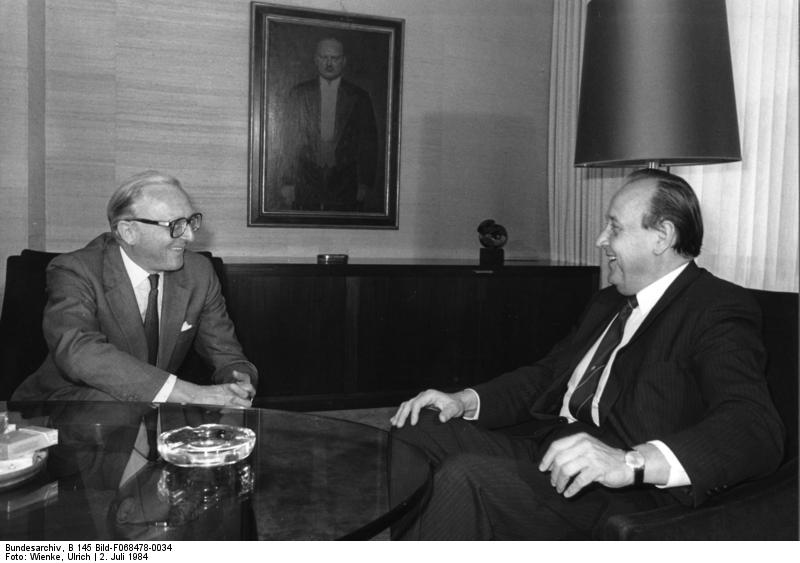
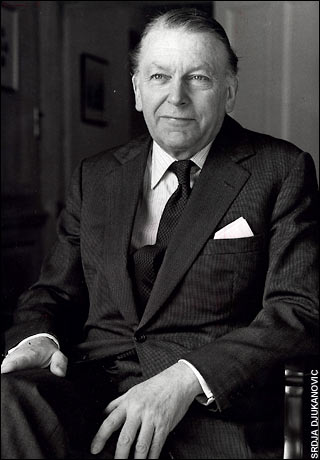
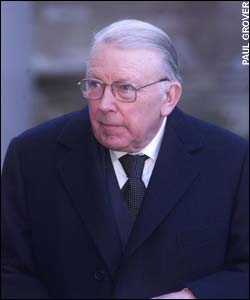
Francis Leslie Pym, Baron Pym (13 February 1922 - 7 March 2008) was a British politician. A member of the Conservative Party, he served in various positions in the Cabinet in the 1970s and 1980s, including Foreign Secretary, Defence Secretary, Northern Ireland Secretary and Leader of the House of Commons. He was Member of Parliament (MP) representing the constituencies of Cambridgeshire (1961 - 83) and South East Cambridgeshire (1983 - 87), and was made a life peer in 1987.
Pym was born at Penpergwm Lodge, near Abergavenny in Monmouthshire. His father, Leslie Pym, was also a Member of Parliament, while his grandfather, the Right Reverend Walter Ruthven Pym, was Bishop of Bombay. He was not a descendant of the 17th century Parliamentarian John Pym as has been commonly held (Pym's own published family history). He was educated at Eton, before going on to Magdalene College, Cambridge. For much of the Second World War, Pym served in North Africa and Italy as a captain and regimental adjutant in the 9th Lancers. He was awarded the Military Cross, and he ended his military service as a major. Pym was a managing director and landowner before he went into politics.
Pym entered politics as a member of Herefordshire County Council in 1958. He contested Rhondda West without success in 1959 and entered Parliament in 1961 at a by-election as Member of Parliament for Cambridgeshire. He held the seat until 1983, and was MP for Cambridgeshire South East 1983 - 87. He was an Opposition whip from 1964 and served under Edward Heath as Government Chief Whip (1970 - 73) and Secretary of State for Northern Ireland (1973 - 74), and Margaret Thatcher as Defence Secretary (1979 - 81), Leader of the House of Commons and Lord President of the Council (1981 - 82). He became foreign secretary during the Falklands War in 1982 following Lord Carrington's resignation, but was removed by Margaret Thatcher in 1983 after her second election victory.
Pym was a leading member of the Wets, or Tory opposition, to the Thatcher government. During the 1983 general election campaign he said on the BBC's Question Time that that "Landslides don't on the whole produce successful governments". This was publicly repudiated by Margaret Thatcher and he was sacked after the election. Shortly afterwards, he launched a pressure group called Conservative Centre Forward to argue for more centrist, One Nation policies. But with Thatcher at the height of her powers, it was unsuccessful. He stood down at the 1987 election and was created a life peer as Baron Pym, of Sandy in the County of Bedfordshire. He was the author of The Politics of Consent published in 1984 after he left office. The book is a guide to the Wets' opposition to Margaret Thatcher, both to her leadership style and policies.
Pym died on 7 March 2008 after a prolonged illness, aged 86.
